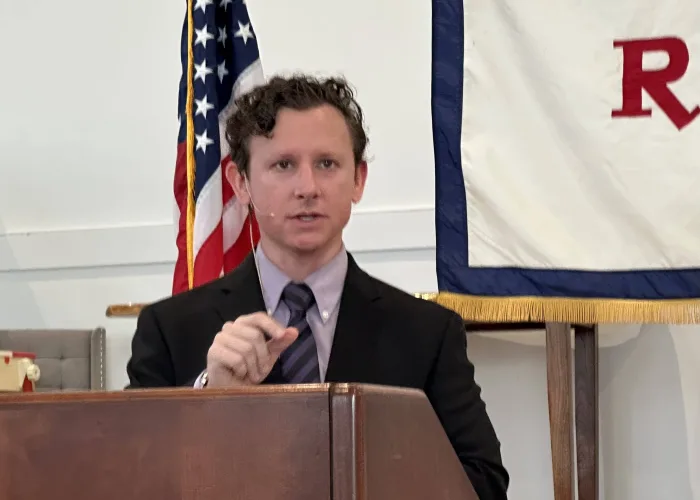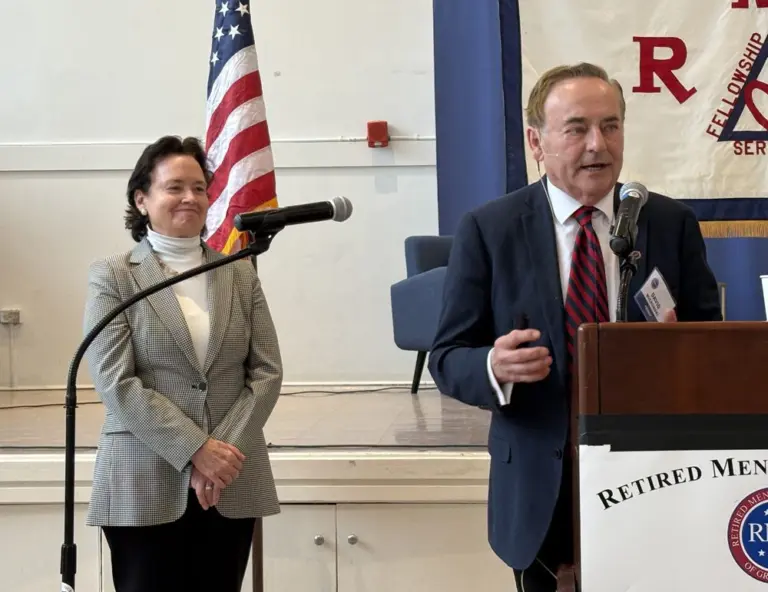
By Fred Wu
At the September 17 meeting of the Retired Men’s Association Steve Boies introduced the speaker, Dr. Matthew McConnell, a neurologist from the Neurology and Headache Center of Greenwich. Dr. McConnell offered an expansive view on dementia, guiding attendees through its complexities, from early indicators to emerging treatments and crucial prevention strategies. Dr. McConnell, whose extensive background includes studies at Duke University, Wake Forest University, and the University of Virginia, followed by an epilepsy fellowship, recently moved to Greenwich after 12 years of practice in Charlotte, North Carolina. His experience illuminated the common concerns surrounding brain health, making his insights particularly relevant for groups such as the RMA.
Dr. McConnell initiated his discussion by meticulously differentiating between the expected cognitive shifts of normal aging and the “red flag” symptoms that necessitate a specialist’s evaluation. While occasional forgetfulness or slower word recall are typical, persistent issues like becoming lost in familiar locales, repeated questioning, significant financial misjudgments, or new, persistent language difficulties that hinder conversation are concerning. Other warning signs include abrupt personality changes, hallucinations, paranoid thoughts, and REM sleep behavior disorder (acting out dreams). He underscored that loss of independence in daily tasks or a consistently worsening pattern observed by family and friends warrants a neurological assessment.
The diagnostic process, Dr. McConnell explained, is comprehensive. It involves detailed history-taking from the patient and, crucially, from multiple family members or even colleagues, whose varying perspectives offer a fuller picture. A neurological exam, including a cognitive screen like the Montreal Cognitive Assessment (MoCA), is standard, with further neuropsychological testing performed by a PhD specialist if concerns remain. Importantly, Dr. McConnell emphasized ruling out reversible causes of memory problems such as thyroid dysfunction, vitamin deficiencies, metabolic issues, Lyme disease, depression, anxiety, sleep disorders, certain medications, alcohol use, and infections. An MRI is also used to identify vascular issues like strokes, differentiating them from other dementia types. Recent advancements in blood-based biomarkers were highlighted, with Lumipulse noted as the first FDA-cleared blood test to diagnose Alzheimer’s by detecting phosphorylated tau, a key protein. Genetic testing for APOE can indicate Alzheimer’s risk and potential drug side effects, but Dr. McConnell advised against routine testing due to the anxiety it can cause without a corresponding cure.
Dementia, he clarified, serves as an umbrella term for memory and thinking skill loss severe enough to impact independence, rather than a specific diagnosis itself. He outlined the most prevalent types:
• Alzheimer’s Disease: The most common, characterized by amyloid plaques and tau tangles that lead to brain cell death and shrinkage, particularly in memory areas like the hippocampus. Early signs often include short-term memory loss and repetition, progressing to difficulties with complex tasks, organization, navigation, and language. Patients frequently have reduced insight into their condition.
• Vascular Cognitive Impairment/ Dementia: The second most common, often preventable by aggressively managing risk factors like high blood pressure, diabetes, smoking, and high cholesterol.
• Lewy Body Dementia: Distinguished by abnormal protein deposits called Lewy bodies, leading to early visual hallucinations, fluctuating alertness, and Parkinsonism (slowness, stiffness, balance issues, and a “pill-rolling” tremor at rest).
• Frontotemporal Dementia: Typically earlier onset (45-65), presenting either as behavioral changes (loss of empathy, disinhibition) or severe language difficulties.
Dr. McConnell offered a reassuring note: dementia is not an inevitable outcome of aging, with less than 45% of individuals reaching 100 years old actually developing it. For decades, Alzheimer’s treatment involved symptom-directed therapies like cholinesterase inhibitors and memantine, providing modest benefits without altering disease progression. The recent approval of Rexulti for Alzheimer’s-related agitation marked a step forward. However, the landscape has significantly evolved with diseasemodifying agents such as Leqembi (Lecanemab) and Donanemab, which aim to slow cognitive decline by clearing amyloid proteins from the brain via intravenous infusions. These drugs have shown about a 30% slower decline, although this initially translated to a modest halfpoint difference on an 18-point clinical scale over 18 months for Leqembi. Newer data, however, indicates a more substantial nearly two-point difference after four years, with some earlytreated patients showing little to no decline. Donanemab demonstrated a slightly greater slowing but with higher rates of ARIA (Amyloid Related Imaging Abnormality), which involves brain swelling and microbleeds, especially in individuals with the APOE E4 gene. The high annual cost (around $30,000) and extensive MRI monitoring present barriers. The recent approval of a subcutaneous form of Leqembi is a promising development for accessibility.
Beyond medication, Dr. McConnell strongly advocated for lifestyle interventions. Regular aerobic exercise (30+ minutes, five days a week), robust social interaction (as exemplified by groups like the Retired Men’s Association), continuous learning, and engaging in hobbies and puzzles are all critical for building cognitive reserve. Addressing hearing and vision impairments is vital, as they are independent risk factors for dementia. A Mediterranean-style diet and alcohol abstinence (even moderate intake is now linked to harm) are also recommended. The only supplement with scientific backing for memory, he noted, is a daily multivitamin, contrasting with unproven “nootropics.”
For caregivers, Dr. McConnell advised a calm, reassuring approach, focusing on redirection rather than confrontation when neuropsychiatric symptoms arise. Keeping detailed logs of symptoms and triggers can aid physicians. Objective driving evaluations can help navigate difficult conversations about driving safety. He also highlighted the invaluable support offered by organizations like CaringKind in New York City and the Alzheimer’s Association, which provide resources and support groups. Finally, Dr. McConnell stressed the importance of proactive family discussions regarding advanced directives, living wills, and designating power of attorney to prepare for future needs.
The RMA’s next presentation, “Economic Growth and Opportunity in Connecticut” by Nick Simmons, is scheduled for 11 AM on Wednesday, October 1, 2025. RMA presentations are held at Christ Church Greenwich, Parish Hall, 254 E. Putnam Avenue, Greenwich, CT 06830.
Nick Simmons, candidate for Connecticut State Senate representing the 36th District, will speak on “Economic Growth and Opportunity in Connecticut,” reflecting on the progress the state has made since 2019. Drawing on his service in Governor Ned Lamont’s administration, Nick will share lessons from his experience shaping and implementing significant economic and workforce initiatives, and what lies ahead to strengthen growth, opportunity, and competitiveness.
From 2019 to 2024, Nick served as a key advisor to Governor Lamont, most recently as Deputy Chief of Staff. In that role Nick led policy formation and directed major state investments across economic development, workforce development, education, transportation, university innovation and clean energy. He led the Governor’s Workforce Cabinet, a collection of the state’s workforce development and education leaders. Nick also led public-private partnerships with major telecommunication companies to close the K–12 digital divide, providing laptops and internet to over 100,000 students. He helped guide millions of dollars in state investments into initiatives spurring economic development such as downtown urban development, upgrading transportation infrastructure, transforming old industrial sites, and redeveloping transit hubs such as the Stamford and New Haven train stations. He also partnered with universities to spur research and innovation, and helped launch the Connecticut Wind Collaborative to position the state as a leader in offshore wind and clean energy.
In 2021, Nick was tapped by the Biden Administration to serve as a Senior Advisor to U.S. Secretary of Education Miguel Cardona, where he helped reopen schools during the pandemic and supported the investment of $160 billion in federal education recovery funds. In 2024 Nick ran for the Connecticut State Senate to represent the 36th District which includes all of Greenwich and parts of Stamford and New Canaan.
He is currently CEO of Pursuit, a nationally recognized workforce development organization that trains individuals for high-quality jobs in the AI economy. He holds a B.A. from Yale University and an M.B.A. and Master of Public Policy from Harvard.
To stream the presentation by Nick Simmons at 11 AM on Wednesday, October 1, click on https://bit.ly/30IBj21. This presentation will also be available on local public access TV channels, Verizon FIOS channel 24 and Optimum channel 79.
Note: The views expressed in these presentations are those of the speakers. They are not intended to represent the views of the RMA or its members.
RMA speaker presentations are presented as a community service at no cost to in-person or Zoom attendees, regardless of gender. Any member of the public who would like to receive a weekly email announcement of future speakers should send a request to members@greenwichrma.org. The RMA urges all eligible individuals to consider becoming a member of our great organization, and thereby enjoy all the available fellowship, volunteer, and community service opportunities which the RMA offers to its members. For further information, go to https://greenwichrma.org/, or contact info@greenwichrma.org.



